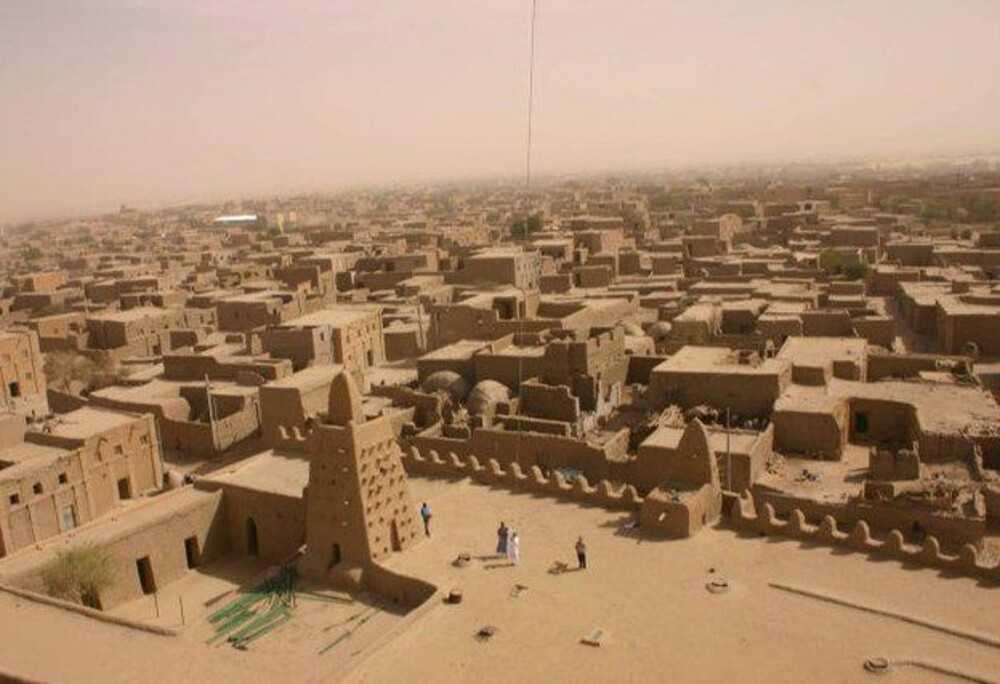Mali - ML - MLI - MLI - Africa
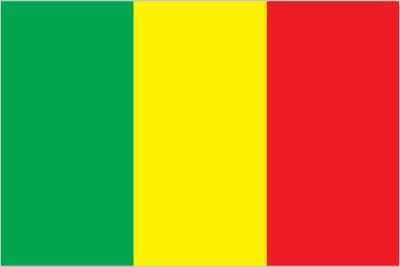
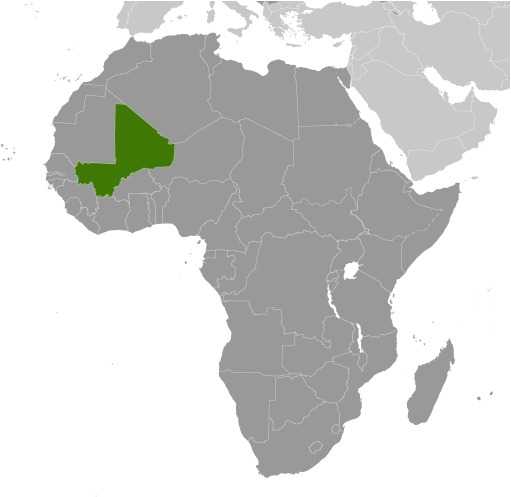
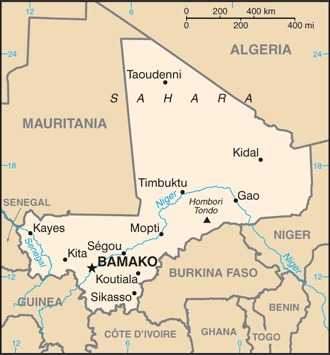
Mali Images
Mali Factbook Data
Diplomatic representation from the US
embassy: ACI 2000, Rue 243, (located off the Roi Bin Fahad Aziz Bridge west of the Bamako central district), Porte 297, Bamako
mailing address: 2050 Bamako Place, Washington DC 20521-2050
telephone: [223] 20-70-23-00
FAX: [223] 20-70-24-79
email address and website:
ACSBamako@state.gov
https://ml.usembassy.gov/
Age structure
15-64 years: 50.1% (male 5,178,742/female 5,842,456)
65 years and over: 3.1% (2024 est.) (male 334,299/female 345,268)
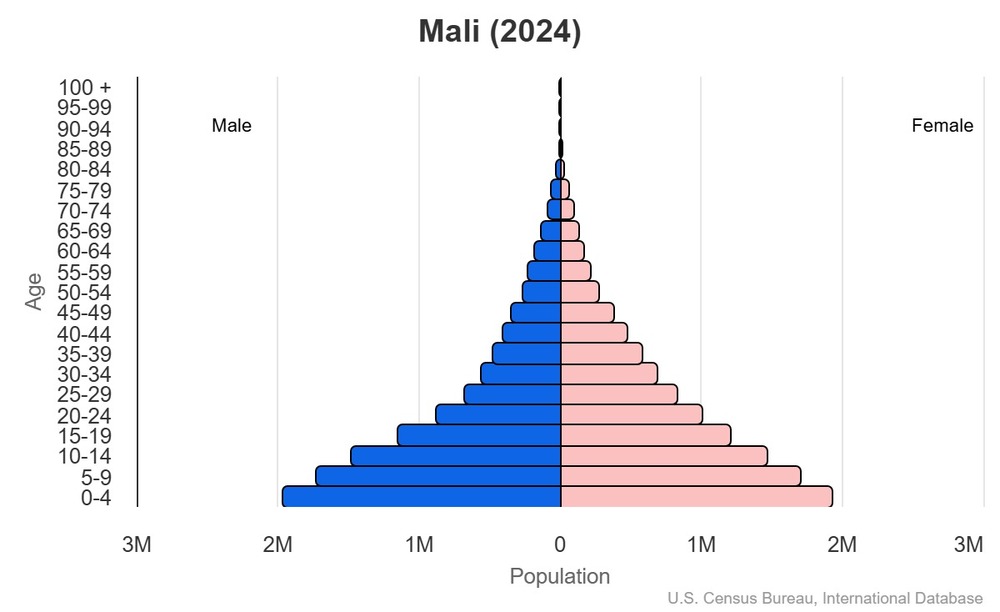
For additional information, please see the entry for Population pyramid on the Definitions and Notes page.
Geographic coordinates
Sex ratio
0-14 years: 1.01 male(s)/female
15-64 years: 0.89 male(s)/female
65 years and over: 0.97 male(s)/female
total population: 0.95 male(s)/female (2024 est.)
Natural hazards
Area - comparative
Military service age and obligation
Background
Present-day Mali is named after the Mali Empire that ruled the region between the 13th and 16th centuries. At its peak in the 14th century, it was the largest and wealthiest empire in West Africa and controlled an area about twice the size of modern-day France. Primarily a trading empire, Mali derived its wealth from gold and maintained several goldfields and trade routes in the Sahel. The empire also influenced West African culture through the spread of its language, laws, and customs, but by the 16th century, it had fragmented into mostly small chiefdoms. The Songhai Empire, previously a Mali dependency centered in Timbuktu, gained prominence in the 15th and 16th centuries. Under Songhai rule, Timbuktu became a large commercial center, well-known for its scholarship and religious teaching. Timbuktu remains a center of culture in West Africa today. In the late 16th century, the Songhai Empire fell to Moroccan invaders and disintegrated into independent sultanates and kingdoms.
France, expanding from Senegal, seized control of the area in the 1890s and incorporated it into French West Africa as French Sudan. In 1960, French Sudan gained independence from France and became the Mali Federation. When Senegal withdrew after only a few months, the remaining area was renamed the Republic of Mali. Mali saw 31 years of dictatorship until 1991, when a military coup led by Amadou Toumani TOURE ousted the government, established a new constitution, and instituted a multi-party democracy. Alpha Oumar KONARE won Mali's first two democratic presidential elections in 1992 and 1997. In keeping with Mali's two-term constitutional limit, he stepped down in 2002 and was succeeded by Amadou Toumani TOURE, who won a second term in 2007.
In 2012, rising ethnic tensions and an influx of fighters -- some linked to Al-Qa’ida -- from Libya led to a rebellion and military coup. Following the coup, rebels expelled the military from the country’s three northern regions, allowing terrorist organizations to develop strongholds in the area. With a 2013 French-led military intervention, the Malian government managed to retake most of the north. However, the government’s grasp in the region remains weak with local militias, terrorists, and insurgent groups competing for control. In 2015, the Malian Government and northern rebels signed an internationally mediated peace accord. Despite a 2017 target for implementation of the agreement, the signatories have made little progress. Terrorist groups were left out of the peace process, and terrorist attacks remain common.
Ibrahim Boubacar KEITA won the Malian presidential elections in 2013 and 2018. Aside from security and logistic shortfalls, international observers deemed these elections credible. Terrorism, banditry, ethnic-based violence, and extra-judicial military killings plagued the country during KEITA’s second term. In 2020, the military arrested KEITA, his prime minister, and other senior members of the government and established a military junta called the National Committee for the Salvation of the People (CNSP). The junta then established a transition government and appointed Bah N’DAW, a retired army officer and former defense minister, as interim president and Colonel Assimi GOITA, the coup leader and chairman of the CNSP, as interim vice president. The transition government’s charter allowed it to rule for up to 18 months before calling a general election.
In 2021, GOITA led a military takeover, arresting the interim president after a Cabinet shake-up removed GOITA’s key allies. GOITA was sworn in as transition president, and Choguel Kokalla MAIGA was sworn in as prime minister. In 2022, the Economic Community of West African States (ECOWAS) imposed sanctions on the transition government, and member states closed their borders with Mali after the transition government presented a five-year extension to the electoral calendar. The transition government and ECOWAS agreed to a new two-year timeline, which would have included presidential elections in February 2024, but the transition government postponed the elections indefinitely in September 2023 and withdrew from ECOWAS in January 2024.
Environmental issues
International environmental agreements
signed, but not ratified: Nuclear Test Ban
Military expenditures
4% of GDP (2023 est.)
3.5% of GDP (2022 est.)
3.4% of GDP (2021 est.)
3.4% of GDP (2020 est.)
Population below poverty line
note: % of population with income below national poverty line
Household income or consumption by percentage share
highest 10%: 28.3% (2021 est.)
note: % share of income accruing to lowest and highest 10% of population
Exports - commodities
note: top five export commodities based on value in dollars
Exports - partners
note: top five export partners based on percentage share of exports
Administrative divisions
Agricultural products
note: top ten agricultural products based on tonnage
Military and security forces
note 1: the Gendarmerie and the National Guard are under the authority of the Ministry of Defense and Veterans Affairs (Ministere De La Defense Et Des Anciens Combattants, MDAC), but operational control is shared with the Ministry of Internal Security and Civil Protection which also controls the National Police; the National Police has responsibility for law enforcement and maintenance of order in urban areas and supports the FAMa in internal military operations
note 2: the Gendarmerie's primary mission is internal security and public order; its duties also include territorial defense, humanitarian operations, intelligence gathering, and protecting private property, mainly in rural areas; it also has a specialized border security unit
note 3: the National Guard is a military force responsible for providing security to government facilities and institutions, prison service, public order, humanitarian operations, some border security, and intelligence gathering; its forces include a camel corps for patrolling the deserts and borders of northern Mali
note 4: there are also pro-government militias operating in Mali, such as the Imghad Tuareg Self-Defense Group and Allies (GATIA); the leader of GATIA is also a general in the national army
Budget
expenditures: $3.563 billion (2020 est.)
note: central government revenues and expenses (excluding grants/extrabudgetary units/social security funds) converted to US dollars at average official exchange rate for year indicated
Capital
geographic coordinates: 12 39 N, 8 00 W
time difference: UTC 0 (5 hours ahead of Washington, DC, during Standard Time)
etymology: the origin of the name is unclear, but it comes from the Bambara language and can refer either to a crocodile or to a person's name
Imports - commodities
note: top five import commodities based on value in dollars
Climate
Coastline
Constitution
Exchange rates
Exchange rates:
606.345 (2024 est.)
606.57 (2023 est.)
623.76 (2022 est.)
554.531 (2021 est.)
575.586 (2020 est.)
Executive branch
head of government: Transition Prime Minister Abdoulaye MAIGA (since 22 November 2024)
cabinet: Council of Ministers appointed by the prime minister
election/appointment process: president directly elected by absolute-majority popular vote in 2 rounds, if needed, for a 5-year term (eligible for a second term); prime minister appointed by the president
most recent election date: 29 July 2018, with runoff on 12 August 2018
election results:
2018: Ibrahim Boubacar KEITA reelected president in second round; percent of vote in first round - Ibrahim Boubacar KEITA (RPM) 41.7%, Soumaila CISSE (URD) 17.8%, other 40.5%; percent of vote in second round - Ibrahim Boubacar KEITA 67.2%, Soumaila CISSE 32.8%
2013: Ibrahim Boubacar KEITA elected president in second round; percent of vote in first round - Ibrahim Boubacar KEITA (RPM) 39.8%, Soumaila CISSE (URD) 19.7%, other 40.5%; percent of vote in second round - Ibrahim Boubacar KEITA (RPM) 77.6%, Soumaila CISSE (URD) 22.4%
note: in 2022, the transition government adopted a charter allowing transition authorities to rule for up to 5 years, but the military junta pushed through a referendum in 2023 that created the potential for transition President GOITA to maintain his hold on power indefinitely
Flag
history: uses the colors of the Pan-African movement
note: the colors from left to right are the same as those of neighboring Senegal (which has an additional green central star) and the reverse of the flag of neighboring Guinea
Independence
Industries
Judicial branch
judge selection and term of office: Supreme Court judges appointed by the Ministry of Justice to serve 5-year terms; Constitutional Court judges selected - 3 each by the president, the National Assembly, and the Supreme Council of the Magistracy; members serve single renewable 7-year terms
subordinate courts: Court of Appeal; High Court of Justice (jurisdiction limited to cases of high treason or criminal offenses by the president or ministers while in office); administrative courts (first instance and appeal); commercial courts; magistrate courts; labor courts; juvenile courts; special court of state security
Land boundaries
border countries (6): Algeria 1,359 km; Burkina Faso 1,325 km; Cote d'Ivoire 599 km; Guinea 1,062 km; Mauritania 2,236 km; Niger 838 km, Senegal 489 km
Land use
arable land: 6.8% (2023 est.)
permanent crops: 0.2% (2023 est.)
permanent pasture: 28.4% (2023 est.)
forest: 8.8% (2023 est.)
other: 55.8% (2023 est.)
Legal system
Legislative branch
legislative structure: unicameral
chamber name: Transitional National Council (Conseil national de transition )
number of seats: 147 (all appointed)
electoral system: plurality/majority
scope of elections: full renewal
most recent election date: 12/5/2020
percentage of women in chamber: 30.1%
expected date of next election: December 2030
note 1: the National Assembly was dissolved on 18 August 2020 after a military coup; the transitional government created a Transitional National Council (CNT) that acts as the transitional government's legislative body; a new constitution was ratified in July 2023 that expanded the military junta's powers, and no plans for legislative elections have been announced
note 2: coup leaders appointed a president and vice president; the president then apportioned CNT seats to various groups and political parties
Literacy
male: 46.2% (2018 est.)
female: 25.7% (2018 est.)
Maritime claims
International organization participation
National holiday
Nationality
adjective: Malian
Natural resources
note: bauxite, iron ore, manganese, tin, and copper deposits are known but not exploited
Geography - note
Economic overview
Political parties
Alliance for Democracy and Progress or ADP-Maliba
Alliance for Democracy in Mali-Pan-African Party for Liberty, Solidarity, and Justice or ADEMA-PASJ
Alliance for the Solidarity of Mali-Convergence of Patriotic Forces or ASMA-CFP
Convergence for the Development of Mali or CODEM
Democratic Alliance for Peace or ADP-Maliba
Movement for Mali or MPM
Party for National Renewal (also Rebirth or Renaissance or PARENA)
Rally for Mali or RPM
Social Democratic Convention or CDS
Union for Democracy and Development or UDD
Union for Republic and Democracy or URD
Yéléma
note 1: only parties with 2 or more seats in the last National Assembly parliamentary elections (30 March and 19 April 2020) included
note 2: the National Assembly was dissolved on 18 August 2020 following a military coup and replaced with a National Transition Council; currently 121 members, party affiliations unknown
Railways
narrow gauge: 593 km (2014) 1.000-m gauge
Suffrage
Terrain
Government type
Country name
conventional short form: Mali
local long form: République de Mali
local short form: Mali
former: French Sudan, Sudanese Republic, Mali Federation
etymology: name derives from the Mali Empire of the 13th to 16th centuries A.D.; the Mali name may come from a local ethnic group, the Malinke, whose name is derived from the words ma, meaning "mother," and dink, meaning "child" -- a reference to the matrilinear descent of Malinke families
Location
Map references
Irrigated land
Diplomatic representation in the US
chancery: 2130 R Street NW, Washington, DC 20008
telephone: [1] (202) 332-2249
FAX: [1] (202) 332-6603
email address and website:
administration@maliembassy.us
https://www.maliembassy.us/
Internet users
Internet country code
Refugees and internally displaced persons
IDPs: 378,363 (2024 est.)
GDP (official exchange rate)
note: data in current dollars at official exchange rate
Total renewable water resources
School life expectancy (primary to tertiary education)
male: 8 years (2017 est.)
female: 6 years (2017 est.)
Urbanization
rate of urbanization: 4.57% annual rate of change (2020-25 est.)
Broadcast media
Drinking water source
urban: 94.7% of population (2022 est.)
rural: 74.4% of population (2022 est.)
total: 83.6% of population (2022 est.)
unimproved:
urban: 5.3% of population (2022 est.)
rural: 25.6% of population (2022 est.)
total: 16.4% of population (2022 est.)
National anthem(s)
lyrics/music: Seydou Badian KOUYATE/Banzoumana SISSOKO
history: adopted 1962
Major urban areas - population
International law organization participation
Physician density
Hospital bed density
National symbol(s)
Mother's mean age at first birth
note: data represents median age at first birth among women 20-49
GDP - composition, by end use
government consumption: 13.1% (2024 est.)
investment in fixed capital: 21.6% (2024 est.)
investment in inventories: -0.7% (2024 est.)
exports of goods and services: 22.5% (2024 est.)
imports of goods and services: -28.4% (2024 est.)
note: figures may not total 100% due to rounding or gaps in data collection
Dependency ratios
youth dependency ratio: 93.4 (2024 est.)
elderly dependency ratio: 6.2 (2024 est.)
potential support ratio: 16.2 (2024 est.)
Citizenship
citizenship by descent only: at least one parent must be a citizen of Mali
dual citizenship recognized: yes
residency requirement for naturalization: 5 years
Population distribution
Electricity access
electrification - urban areas: 99.7%
electrification - rural areas: 18.3%
Civil aircraft registration country code prefix
Sanitation facility access
urban: 88.6% of population (2022 est.)
rural: 49.3% of population (2022 est.)
total: 67.2% of population (2022 est.)
unimproved:
urban: 11.4% of population (2022 est.)
rural: 50.7% of population (2022 est.)
total: 32.8% of population (2022 est.)
Ethnic groups
Religions
Languages
note: Mali has 13 national languages in addition to its official language
Imports - partners
note: top five import partners based on percentage share of imports
Elevation
lowest point: Senegal River 23 m
mean elevation: 343 m
Health expenditure
5.7% of national budget (2022 est.)
Military - note
the FAMa and other security forces are actively engaged in combat operations against several insurgent/terrorist groups affiliated with al-Qa'ida and the Islamic State of Iraq and ash-Sham (ISIS), as well as other armed rebel organizations, communal militias, and criminal bands spread across the central, northern, and southern regions of the country; a large portion of the country--up to 50% by some estimates--is outside of government control
the FAMa and the remainder of the security forces collapsed in 2012 during the fighting against Tuareg rebels and Islamic militants and were rebuilt beginning in 2013 with external assistance from the EU and the UN; the UN Multidimensional Integrated Stabilization Mission in Mali (MINUSMA) and the EU Training Mission in Mali (EUTM) ended their missions in 2023 and 2024, respectively; France intervened militarily in Mali in 2013 to assist with regaining the northern half of the country from rebel and Islamic militant groups; French troops withdrew in 2022; since 2021, Mali has increased security ties with Russia, which has provided equipment, training, and other forms of military support (2025)
Military and security service personnel strengths
Terrorist group(s)
note: details about the history, aims, leadership, organization, areas of operation, tactics, targets, weapons, size, and sources of support of the group(s) appear(s) in the Terrorism reference guide
Total water withdrawal
industrial: 4 million cubic meters (2022 est.)
agricultural: 5.075 billion cubic meters (2022 est.)
Waste and recycling
percent of municipal solid waste recycled: 10.4% (2022 est.)
Major aquifers
Major watersheds (area sq km)
Major lakes (area sq km)
note - the Niger River is the only source of water for the lake; in recent years the lake is dry
Major rivers (by length in km)
note: [s] after country name indicates river source; [m] after country name indicates river mouth
National heritage
selected World Heritage Site locales: Old Towns of Djenné (c); Timbuktu (c); Cliff of Bandiagara (Land of the Dogons) (m); Tomb of Askia (c)
Child marriage
women married by age 18: 53.7% (2018)
men married by age 18: 2.1% (2018)
Coal
Electricity generation sources
solar: 3.5% of total installed capacity (2023 est.)
hydroelectricity: 37.6% of total installed capacity (2023 est.)
biomass and waste: 1.6% of total installed capacity (2023 est.)
Petroleum
Currently married women (ages 15-49)
Remittances
4.9% of GDP (2022 est.)
4.9% of GDP (2021 est.)
note: personal transfers and compensation between resident and non-resident individuals/households/entities
National color(s)
Particulate matter emissions
Labor force
note: number of people ages 15 or older who are employed or seeking work
Youth unemployment rate (ages 15-24)
male: 4% (2024 est.)
female: 3.9% (2024 est.)
note: % of labor force ages 15-24 seeking employment
Debt - external
note: present value of external debt in current US dollars
Maternal mortality ratio
Unemployment rate
3% (2023 est.)
2.4% (2022 est.)
note: % of labor force seeking employment
Population
male: 10,688,755
female: 11,301,852
Carbon dioxide emissions
from coal and metallurgical coke: 83 metric tonnes of CO2 (2023 est.)
from petroleum and other liquids: 6.858 million metric tonnes of CO2 (2023 est.)
Area
land: 1,220,190 sq km
water: 20,002 sq km
Taxes and other revenues
note: central government tax revenue as a % of GDP
Real GDP (purchasing power parity)
$67.857 billion (2023 est.)
$64.8 billion (2022 est.)
note: data in 2021 dollars
Airports
Gini Index coefficient - distribution of family income
note: index (0-100) of income distribution; higher values represent greater inequality
Inflation rate (consumer prices)
2.1% (2023 est.)
9.6% (2022 est.)
note: annual % change based on consumer prices
Current account balance
-$1.475 billion (2022 est.)
-$1.469 billion (2021 est.)
note: balance of payments - net trade and primary/secondary income in current dollars
Real GDP per capita
$2,900 (2023 est.)
$2,800 (2022 est.)
note: data in 2021 dollars
Broadband - fixed subscriptions
subscriptions per 100 inhabitants: 1 (2022 est.)
Tobacco use
male: 13.1% (2025 est.)
female: 0.6% (2025 est.)
Obesity - adult prevalence rate
Energy consumption per capita
Electricity
consumption: 4.261 billion kWh (2023 est.)
exports: 661.63 million kWh (2023 est.)
imports: 880 million kWh (2023 est.)
transmission/distribution losses: 320.616 million kWh (2023 est.)
Children under the age of 5 years underweight
Imports
$7.942 billion (2022 est.)
$7.596 billion (2021 est.)
note: balance of payments - imports of goods and services in current dollars
Exports
$5.855 billion (2022 est.)
$5.381 billion (2021 est.)
note: balance of payments - exports of goods and services in current dollars
Heliports
Telephones - fixed lines
subscriptions per 100 inhabitants: 1 (2022 est.)
Alcohol consumption per capita
beer: 0.09 liters of pure alcohol (2019 est.)
wine: 0 liters of pure alcohol (2019 est.)
spirits: 0.02 liters of pure alcohol (2019 est.)
other alcohols: 0.49 liters of pure alcohol (2019 est.)
Life expectancy at birth
male: 60.9 years
female: 65.6 years
Real GDP growth rate
4.7% (2023 est.)
3.5% (2022 est.)
note: annual GDP % growth based on constant local currency
Industrial production growth rate
note: annual % change in industrial value added based on constant local currency
GDP - composition, by sector of origin
industry: 22.7% (2024 est.)
services: 36.7% (2024 est.)
note: figures may not total 100% due to non-allocated consumption not captured in sector-reported data
Education expenditure
17.8% national budget (2024 est.)
Military equipment inventories and acquisitions
Gross reproduction rate
Net migration rate
Median age
male: 15.7 years
female: 17.1 years
Total fertility rate
Infant mortality rate
male: 62.6 deaths/1,000 live births
female: 52 deaths/1,000 live births
Telephones - mobile cellular
subscriptions per 100 inhabitants: 114 (2022 est.)
